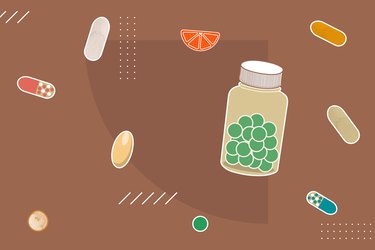
Supplements for heart health can work to regulate your blood pressure and heart rate. However, you may experience negative side effects, like arrhythmias, by taking large amounts of these supplements. Even essential vitamins and minerals can be harmful if you take too much.
Tip
Many supplements for heart health can alter the heart rate. These include minerals like magnesium and potassium, and vitamins like vitamin D.
Video of the Day
Nutrient Deficiencies and Heart Rate
There are a variety of essential nutrients you need on a daily basis that play a role in heart health. If you don't get enough of some of these, you might notice changes in your heart rate, especially palpitations, according to the Cleveland Clinic. Heart palpitations are when you feel like your heart is racing, pounding or skipping beats.
Video of the Day
Some examples include the electrolytes potassium and magnesium and vitamin D, according to Harvard Health Publishing.
That said, it's more likely for too much of a certain nutrient to affect your heart, rather than too little. Getting too much of certain nutrients can cause palpitations, irregular heart beats and changes in your heart rate.
Dietary Supplements and Heart Rate Changes
If your cardiovascular system has been giving you issues due to a vitamin or mineral insufficiency, your doctor will likely recommend that you take heart-healthy supplements. But it's important to know about the impact of supplements on heart rate so you don't take too much.
Vitamins can cause an increased heart rate or irregular heart rate, called arrhythmia, according to the American Heart Association. Arrhythmias come in many different types. The term can refer to your heart beating too quickly, too slowly or erratically.
Conditions like tachycardia, bradycardia, atrial fibrillation and ventricular fibrillation are all types of arrhythmias that can occur because of herbal remedies, nutrient deficiencies or vitamins and supplements.
Here are some supplements that can increase or otherwise change your heart rate to know about. (Keep in mind you can also get these nutrients in heart-healthy foods!)
Potassium
Large amounts of potassium typically cause mild side effects that primarily affect your gastrointestinal system. However, high doses of potassium supplements have the potential to cause hyperkalemia, which essentially refers to a build-up of potassium in your body.
This condition can cause a variety of muscle issues and affect your heart rate. It may cause palpitations and life-threatening arrhythmias, according to the Office of Dietary Supplements (ODS). A healthy amount for adults is 2,600 to 3,400 milligrams daily.
Magnesium
Large amounts of magnesium can also cause heart problems. It's rare for healthy people to experience magnesium toxicity, but it's possible for this to occur if you take high doses of supplements, according to the ODS. Excessive magnesium can cause very low blood pressure, an irregular heartbeat and even heart attacks. Magnesium toxicity can result in death. Adults need between 310 and 420 milligrams a day.
Vitamin D
Similarly, large amounts of vitamin D can damage the blood vessels and the heart. Excessive amounts of this nutrient can also cause cardiac arrhythmias. Like with magnesium, you're only likely to experience vitamin D toxicity if you overdo it on supplements, according to the ODS. Adults should get about 600 to 800 IU a day.
Brain Health Supplements
A number of dietary supplements typically taken to enhance cognitive function have been linked with changes to the heart rate, such as ginseng, taurine and Ginkgo biloba, according to an October 2014 study in Trends in Endocrinology and Metabolism. The researchers reported these ingredients can increase blood pressure and cause tachycardia (otherwise known as elevated heart rate).
Caffeine
Caffeine is perfectly healthy in moderation — generally less than 400 milligrams a day, or about the amount in four cups of coffee. But in large doses, like the amount you might get if you take caffeine supplements, it's well-known to cause cardiac side effects and increase heart rate.
What About Vitamin C?
Not every nutrient will cause heart issues. For example, vitamin C (also known as ascorbic acid) is considered incredibly important for heart health. According to an August 2016 study in the International Journal of Molecular Sciences, this nutrient can help improve heart health and reduce the risk of cardiovascular disease.
It is possible to consume large amounts of vitamin C with minimal side effects, according to the ODS. Having vitamin C increase heart rate, slow heart rate or influence it in any way is very unlikely.
When to See a Doctor
If you have already been experiencing cardiovascular issues, you should talk to your doctor before integrating any supplements — whether or not they might increase your heart rate — into your diet.
Otherwise, talk to your doctor after starting any new supplement if you notice your heart rate beating faster, slower or less regularly than normal.
Seek immediate medical attention if you're also experiencing chest pain, dizziness, shortness of breath or lightheadedness, according to the Mayo Clinic.
- Trends in Endocrinology and Metabolism: "Impact of Caffeine and Coffee on Our Health"
- International Journal of Sport Nutrition and Exercise Metabolism: "Nutritional Supplements and the Brain"
- ODS: "Vitamin C"
- International Journal of Molecular Sciences: "Vitamin C and Heart Health: A Review Based on Findings From Epidemiologic Studies"
- American Heart Association: "About Arrhythmia"
- Harvard Health Publishing: "Listing of Vitamins"
- Cleveland Clinic: "How Supplements Affect Heart Palpitations"
- ODS: "Potassium"
- ODS: "Magnesium"
- ODS: "Vitamin D"
- Mayo Clinic: "Tachycardia"


